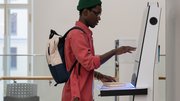News
Company seeks funding to market photo kiosks that use 'dry' developing process
March 19, 2003
AUSTIN, Texas -- Applied Science Fiction Inc., a photo software and hardware company formed in 1995 as a spinoff of IBM Corp., is seeking $15 to $20 million in funding to sell kiosks that utilize its "dry" film developing process
After developing a way to process film without using chemicals, it planned to license the technology to companies such as Eastman Kodak Co. or Fuji Photo Film Co. Ltd., which would incorporate the technology into their photo kiosks.
However, Applied Science Fiction has decided to cut out the middleman and sell its own kiosks directly to customers -- which will force it to compete against companies such as Kodak. Ghe company decided to market its own kiosks after building kiosks to ship to five stores as part of the testing of its dry film processing.
According to a report in the Austin Business Journal, Applied Science Fiction has already raised $5 million as part of a bridge loan led by Rho Capital Partners, CenterPoint Ventures LP and Sevin Rosen Funds. Before the bridge loan, the company had raised about $98 million in venture capital.
Unlike other companies' kiosks, Applied Science Fiction's allow image enhancements using its software, negatives to be delivered on a CD and, most importantly, the ability to insert a roll of film in the machine and produce prints -- without using chemicals -- in less than 10 minutes.
The company's kiosks can benefit photo retailers by cutting labor costs and eliminating environmental risks tied to chemicals, said Danny Sullivan, its president and chief executive.
In tests of the machine, consumers tended to spend twice as much per roll of film compared with typical film developing, Sullivan said. Consumers would buy extra reprints and "upsell" themselves on photo enhancements and enlargements.
Jerry Sullivan, president of Austin-based camera store Precision Camera LP, said the biggest benefit of an Applied Science Fiction kiosk is the "upselling" aspect. Photo enhancements generate profit on a sector of Precision's business that yields low profit margins, he said.
Sullivan said his company's kiosks can be monitored through the Internet to indicate when and why a machine isn't working. Furthermore, Applied Science Fiction initially will target photo stores that employ trained technicians.
If stores already operate "wet" labs and don't want the dry film processing, that could eat into Applied Science Fiction's sales. Sullivan estimated the company needs to sell 1,200 to 1,400 machines for the company to become profitable, which he said should occur at the end of 2004.
Applied Science Fiction, which has 79 employees, posted revenue of $8 million in 2002. Its revenue model for the kiosk is based on selling the machines, which cost $60,000 to $80,000 each for the "dry" version and an editing station, and a regular supply of development solution. It also sells photo enhancement software.
The kiosk and its digital dry film processing system was named "Best of What's New" in the photo category of Popular Science magazine's annual ranking of best innovations in December. (See related story ASF's digital PIC kiosk named 'Best of What's New')










